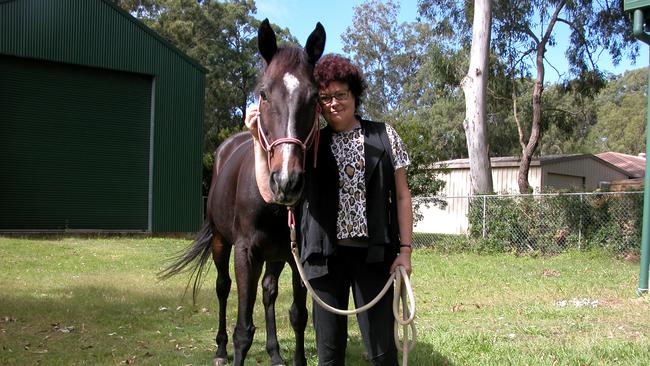Elvis and Me: Gillian Wills saved by a rescued horse
We see the deep affinity possible between humans and animals, but also the huge chasm between their ways of existence.

After nine years as dean of music at the Victorian College of the Arts, and a divorce, Gillian Wills moved to Queensland in 2001. There she taught at tertiary level for a while before freelancing as a music reviewer and broadcaster. Reconciled to these changes, and living with Rhys — an artist and professor of painting — she remained a restless 56-year-old.
On a whim, this ‘‘eternal champion of the disadvantaged’’ (as she ruefully judges herself) decided to buy a retired racehorse off a rundown property in NSW. She found Elvis ‘‘rangy, insect-mauled and tripping on stony ground with overshod shoes’’. He was as unprepossessing as a horse could be. Yet he became half of the intriguing story that Wills tells in Elvis and Me , the story of ‘‘how a world-weary musician and a broken racehorse rescued each other’’.
Wills’s book has affinities with Helen Macdonald’s acclaimed H is for Hawk, in which a woman grieving for her father decides to train a goshawk. Elvis — veteran of 48 starts and some victories — will never return to a racetrack. Indeed, almost as soon as he is purchased, Wills has to enlist veterinarian and other expert help to keep him alive in the face of ulcers, wind-sucking and a near fatal attack of colic.
Expenses rise. So does her frustration. She discovers that ‘‘there are ferociously guarded borders in equestrian arts just as there are in the music world’’. When she explains to one new acquaintance that her friends cannot understand the decision to buy and take care of Elvis, Wills is brusquely advised to change her friends. She learns to depend on farriers, people who in their chosen occupation strike her as quirky as piano tuners. As, gradually, she gains confidence — though never to the extent of wanting to ride Elvis regularly or strenuously — Wills is told that horses can sense ‘‘a stronger you’’.
In professional life she was tempered by hard trials. Wills takes us back to the dare that gained her admission, in 1969, to the Royal Academy of Music, a place ‘‘smelling of cleaning fluid, musty books and fear’’. She chose the toughest of schools in which to teach before moving to Australia in 1986 with her then husband. Here she encountered another kind of fear, engendered by the ‘‘restructuring’’ of academic institutions and its ill-considered human costs.
Long before then, she had survived the unhappy life of her family: ‘‘turmoil and mayhem reigned supreme in our semi-detached and a dark space grew within’’. Wills’s narrative is principally concerned with the travails of her commitment to Elvis, but within it is a slow, intermittent and telling release of her much longer life story — not least the escape from England, in particular from the ‘‘estranged, embittered, eagle eye’’ of her mother.
When Aileen is introduced, early in the book, she is an old, demented, seemingly harmless woman who ‘‘lifted her arms and rattled a braceleted quarry of silver charms’’. In Wills’s childhood, her mother was a relentless disparager of her younger daughter. Perhaps this was a compensation for the ‘‘alcohol-crazed rants’’ of an abusive husband. Freddie is the most tantalising character in Elvis and Me. Wills lets us see her father only in glimpses: ‘‘[reciting] Russian poetry in his sleep’’, RAF squadron leader awarded a gong, test pilot after the war, then foreign correspondent for Britain’s Daily Mirror. Wills lets us infer that from the damage inflicted by her father she acquired resilience and discipline. ‘‘I was fatally drawn to taming intelligent, troubled, out of the ordinary, awkward yet loveable male scallywags,’’ she writes.
Elvis and Me encompasses both the ‘‘complex diaspora of some ten thousand equine professionals’’ in Australia and the comic events of second marriage for both Rhys and Wills. The ‘‘sorriest horse I’ve ever seen’’ gives Wills the solace that tacitly she had been seeking.
Elvis, who raced as Memphis Tennessee, was spared what Wills calls ‘‘the doggers’’ (pet food was not his end) in his post-racing days.
This unusual and accomplished tale shows us the deep affinity possible between humans and animals while recognising the unbridgeable chasm between their ways of existence. Demanding as this recognition is, Wills is no longer ‘‘world weary’’ by the time we leave Elvis and his companions at The Last Chance Ranch.
Peter Pierce’s books include From Go to Whoa: A Compendium of the Turf.
Elvis and Me
By Gillian Wills
Finch Publishing, 245pp, $27.99



To join the conversation, please log in. Don't have an account? Register
Join the conversation, you are commenting as Logout